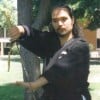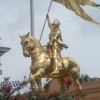Native Americans- the atrocities
How does a country ever make up for wiping out it's first inhabitants? Inhabitants who loved and revered the land and watched it greedily devoured by invaders?? What is the price America pays for what it did? How can we atone for what we did and why haven't we done more?
Great and long lasting harm cannot be done without it having great and long lasting effects. Some people think a deep wound can be inflicted without doing something to remedy and heal it. The Native American community has high rates of suicide, poverty, alcoholism, violence, etc. These are symptoms of being pushed about and killed and tortured. People want to argue about who should do something about that, but it's not who but *if* we should do something. One thing we could do about it is by not doing the very same thing here and in other parts of the world right now. And it would help if there was real help for the Native American community too, and not just business opportunities; business opportunities don't heal these kinds of wounds. But here's the main thing: Violence begets violence. This is universal law.
- JaxsonRaineposted 11 years ago
0
*WE* didn't do anything.
Throughout history, even to this day, there are groups killing off other groups. Native Americans killed each other too. We're just now coming into an age where the worldwide society is looking down on using force in those ways.Who is responsible, then, for the murder and stripping of freedom of an entire people?
Should we justify every mass murder and genocide because "throughout history, groups have killed off other groups"? Unless you are of Native American, or, say, Jewish lineage- and had your ancestors, your relatives, your history, stomped on - I don't think you can say "we" didn't do anything. Someone, at some point, must take responsibility and pay for the sins of other generations of people. Either deliberately to try to make some right out of such terrible wrongs,- or though the repurcussions and consequences of those sins committed and forgotten.
I know that there were good and bad on both sides, I know that what America has stood for has been very good and worthy for the most part. The difficulty is reconciling the good and the evil that came with creating a nation under God. The difficulty is understanding why our ancestors thought they had the right to life and freedom - and in fact, came over to America to find those rights and freedom- but decided that those pursuits didn't apply to other groups of people.
If you're of European descent and you're an American, you have fared better in the past 200 years than those of Native descent. Brushing off what happened as" just what people did throughout history", and not acknowledging that there should be retribution and repayment and recognition of some sort, or is simply not worth thinking about- to me, is the same kind of thinking that caused one group of people to think they had a right to kill and oppress another group. And that kind of thinking continues the oppression of a whole people. I don't know what the answer is, but I know justifying and defending and wanting to forget what happened is not going to work. Native Americans don't have the luxury of attributing their downfall to history. They live it, still, in many respects.
My ancestors were in America from very early on , and although I don't know if they personally were friend or foe of the Indians, I know that as a new nation, who claimed to believe in God and freedom, the sacred land and freedom of another people was usurped. As an American, a patriotic one, a good, conservative Republican who is also a Christian- following in my ancestors footsteps- I hate what early Americans, people of my descent, people of my beliefs, did to the Indians and their land in the name of all that was good.
I think it is worth thinking about with honesty and clarity.Uuuuhhhh that could be bad for America as the biggest militarized nation in the history of the world. We can vanquish a foe in a matter of hours and move our political and strategic forces in to take the country totally within a few months. Our industries can supply the arms and equipment to effect the destruction and then some of the same companies can supply the equipment and supplies to build it up again in our own image. Almost like a food cycle isn't it?
Two questions though. What happens if the indigenous populace don't settle and what if we effectively take over all the countries that oppose our empire?
- JaxsonRaineposted 11 years ago
0
I'm sorry. I don't believe, nor will I ever believe, that one person is responsible for the actions of another. I'm sorry you feel so upset about past injustices, but nobody alive today is responsible for the actions of their ancestors.
You don't have to be sorry. And I don't think that one person is responsible. I think humanity(we) is responsible and I don't think we can just blow off something because it happened awhile back. History always repeats itself.
So you want society(people who aren't responsible for history) to do something for others in society(who never had anything done to them) to pay back the people who had things done to them(who no longer exist)?
Really? They must be pretty old by now...
or who are you even talking about?
People need to stop blaming their situation on what happened to their ancestors.The funny thing about 'blame'
 only been about the last 50 yrs that NA's have been allowed to do things in their own nations. Canada finally made FN's 'citizens', permission to vote, run their own reserve's without an appointed non-band member, 'agent' and leave the rez without worrying about getting arrested or accused of some crime. Treatment as the enemy prevailed for many years
only been about the last 50 yrs that NA's have been allowed to do things in their own nations. Canada finally made FN's 'citizens', permission to vote, run their own reserve's without an appointed non-band member, 'agent' and leave the rez without worrying about getting arrested or accused of some crime. Treatment as the enemy prevailed for many years  Healing from racism from schooling, child protection services and other methods of 'interference' has to be overcome. I feel there's hope but not till maybe another 2 generations
Healing from racism from schooling, child protection services and other methods of 'interference' has to be overcome. I feel there's hope but not till maybe another 2 generations  culture has been lost but is slowly being re-learned, least in Canada. USA aboriginals still have issues to overcome also, but can't really say too much since I'm not from one of their bands. It will take some seriously educated and experienced leaders who genuinely care, to bring their respective bands, forward.
culture has been lost but is slowly being re-learned, least in Canada. USA aboriginals still have issues to overcome also, but can't really say too much since I'm not from one of their bands. It will take some seriously educated and experienced leaders who genuinely care, to bring their respective bands, forward.I didn't know it's only been the last 50 years. I don't know much at all except from what Ive read, and from what I've read, it seems like there's a huge gaping hole in the fabric of America that we haven't recognized or fixed. I dont know what the answers are, but I'm glad that you see hope in the next couple of generations. I think hope is maybe the key to healing.
If I'm right, I think that Native Americans have traditionally seen life as a circle. They have always felt connected to their ancestry in a way maybe whites have not . I don't know if this still holds true, but if it does, then the things that happened to their ancestors are very much alive for them. And maybe that's why their troubles still persist. That's what I meant .
I think a couple of good books to read on the subject are "Neither Wolf nor Dog" by Kent Nerbern, and "Bury my Heart at Wounded Knee" by Dee Brown.
Both of the books show how for whites, the problems were ended when the Natives were put on reservations. At the same time nothing was solved for the Native Americans. In fact, that phase started many new problems for them.
Everyone is responsible for themselves, and their choices, I agree, and I'm not blaming whites for all of the issues Native Americans face. But I think America does have to take responsibility for the journey the Native people have taken, the hell they were put through by Americans well into the 20th century. It was over for the whites long ago. Forgotten. The Native Americans have been haunted ever since. No good that the whites have tried to do since can possible make up for what happened. The direct repurcussions and consequences of what happened in that time do still exist for Native Americans..
- HowardBThinameposted 11 years ago
0
The discovery of Kennewick Man in New England shows that Eurasian people lived on the North American continent before Native American's lived here.
That civilization is also gone. Did the Native Americans wipe them out? I don't know. No one does, but over thousands of years, different cultures rise and fall within set geographic areas.
I don't think it's right or good to run anyone "off their land" but I think at the time the pioneers were making their way across the continent that the way of thinking was much different.
The only thing we can do for anyone is to treat them equally and give them an equal shot at succeeding.
Perhaps tribes that still occupy reservation lands should divide the land between the tribe members and allow each one to set out on their own. No more sovereignty. Just American citizens with the same rights as all other citizens. I guarantee that some would make big bucks if given the chance.I know what you're saying about people throughout history killing each other off, invading, etc. etc. All of the evils of the world that have been happening since time began.
But I'm talking about America, modern(past 200 years) America. And I'm talking about an unresolved issue. The Native Americans today still suffer from the wounds inflicted 100, 200 years ago. They are still displaced, they still have their history, culture, language and traditions evaporating more each generation. They have a huge percentage of their people suffering from alchoholism and suicide. I think those issues are directly related to the losses suffered over time.
I don't think you and I are responsible. We did not do anything. But the fabric of our nation, a nation built on God, life, freedom and the pursuit of happiness, was also built on the greed, selfishness, ignorance and violence of a few. Quite a few. Over and over again. Read what happened to Crazy Horse, Sitting Bull, Cochise, Black Kettle. I would go so far as to say we took the soul of a whole nation of people. And they still suffer from the loss today.
So that is the difference to me. Not that I think the W.A.S.P. is responsible for every wrong in the country, I don't believe that. I think that the Europeans who came to this country were brilliant, good people for the most part. It's the duality of what happened then. The good, the bad and the ugly. But it bothers me to think that we have decided as a nation to forget the remnants of the Native Americans who lost a part of who they were. I agree that the reservation system should be changed in some way, but money has never been a motivating factor for Native Americans that I can see. And making and having money is the world we live in . So maybe there are no answers- maybe there is nothing we can ever do or should try to do to make up for the past. I don't know. But I think it's worth talking about.I think you are making dangerous 100% statements. Do you have statistics to back up any of your claims? What you believe to be true and what is true may be completely different. Now, not all Indian tribes are equal or currently successful, but the Choctaw Nation of Oklahoma has a positive economic impact of $800 million+ in its area. A review of their website shows a great deal of benefits offered to tribe members, both locally and nationally. The Nation also does a great deal to teach the language and history of the Choctaws to current tribe members.
In some ways, I think we should view things under the light of Thomas Sowell's response on reparations for slaves:
"The people made worse off by slavery were those who were enslaved. Their descendants would have been worse off today if born in Africa instead of America. Put differently, the terrible fate of their ancestors benefited them. If those who were enslaved were alive, they would deserve huge reparations and their captors would deserve worse punishments than our laws allow. But death has put both beyond our reach. Frustrating as that may be, creating new injustices among the living will not change that."
I think it is definitely possible that Indian tribes have benefited greatly from America's economic system. (Indian casino, anyone?) Would they have been better off on their own? That is debatable, at best. Yes, there are some areas or individuals that are not doing well, as with any demographic group. But, nothing can change history; and, to my knowledge, the Choctaw Nation of Oklahoma does not attempt to seek reparations; they provide for their own within the current confines of the American system. Though you may feel some sense of altruism about talking about the injustices of the Indian tribes, it does nothing to help the issue.
See some interesting stats here:
http://www.infoplease.com/spot/aihmcensus1.html
Full disclosure: I am a legally registered and recognized member of the Choctaw Nation of Oklahoma, both with the tribe and the Bureau of Indian Affairs. I receive annual birthday cards and Christmas ornaments with a card signed by the Chief. I also receive the "Biskinik," the official newspaper of the tribe.Maybe I am discussing this for some sort of personal, self indulgent catharsis. And I will go so far as to say I realize I don't have a right to have an opinion on the subject. My statements are educated opinions based on reading what others have said about all of it. I haven't lived it, I don't have family who has lived it, I only know what I've read. But I've read a lot of words and thoughts from Sitting Bull, Black Kettle, Cochise, Crazy Horse, Black Elk, Eskiminzin, Donohowgawa, Geronimo, Quanah Parker- and I've read contemporary books and biographies of Natives. Enough at least, to have an opinion and to see that there is still a lot wrong- not apart from what happened then, but directly related to what happened then. Lives of human beings still being affected,repurcussions of what happened in the not so distant past. I love America, but it's difficult to reconcile what happened here, and what exactly is happening now within the reservations. How do Native Americans feel about the past and the country now? I agree with your quote about repatriation. I don't think that there was one great evil done that will never be equalized. But I think that the duality of good and evil originating in the building of this country is worth talking about.America has stood for good in the world for a long time. It's the world's greatest experiment as far as I'm concerned. But there was is a huge price that comes with it, and so much hypocricy, greed, self- centeredness , racism and violence. Things we deal with still in other forms today. It's not just a philosophical meandering, it's still all relevant.
I have a lot of questions and I'm trying to understand. Maybe it's not my place to try to understand or talk about, or maybe you think white Americans need to stay out of it, period. But you can just tell me that and we'll be done.I won't be offended. Otherwise, I have some questions that I would truly like to have answered by someone who knows.
How do you see the state of the Native Americans today, on the whole, in the U.S.? Do you see things improving? Economically, spiritually, emotionally, and within the family?
Do you see the casino industry as the economic answer? How do you reconcile the entire casino "mentality " with what the ancestral Native Americans believed ?
What do you see as the best possible future for Native Americans on and off reservations?
Thanks for commenting.I think you need to study a little more history, not just American but World history. Do you think people in other parts of the world are sitting around wondering how they can make up for past invasions or conquests? Nope, they are either fully withdrawn from the lands they conquered, for various reasons, or they are still reaping the benefits of that conquest. It's just human nature, and it's not going to change no matter how evil and terrible some people believe it to be.
You are suffering from 'white guilt' and you need to move on. Those who didn't evolve into the new century will be left behind, and those who choose not to enter American society and sink or swim will never know what they are missing. Living on a reservation, and in the past, will get you (them) nowhere.History is usually written by victors and is subject to serious review as new information comes to light. In the instance of North America's First Nations, the stories coming from the First Nations people, who are now gaining access to the instruments with which to communicate, are sometimes in stark contradiction of the history that was taught by the vanquishing societies.
I am not an aboriginal myself but many of my friends are. I know of the heartrending struggles the First Nations are going through to try and bring their people into modern society. I object to flippant attitudes on the part of "white" people who don't understand the nature of the trauma endured by the First Nations. When you say things like "those who choose not to enter..." it is obvious to me that you do not understand the language, which is of a spiritual nature, of the people you are preaching at.
A little more...no, make that a lot more, kindness is required for this issue to be successfully resolved.Racism, violence, ignorance, arrogance, hatred- all part of human nature. Human nature has a duality to it also, good and evil. We choose. But only by learning from past past mistakes and integrating that understanding into the future. That's called wisdom.
Ignorance won over wisdom when the Native Americans lost all of their lands.Ignorance won not only because of the final outcome of what happened, but how it happened. A devaluation of humanity.
The Natives knew the sound of every tree rustling in the wind, the song of the birds, they knew every berry and grass that grew.The migration of the buffalo, they understood sounds and patterns in nature that predicted changes. Their human nature permeated the land and it was theirs in a unique way.
I think what is not understood is that the sins of the past with the Native Americans goes deeper than just a "white guilt thing" that needs to be moved past. That attitude is exactly the opposite of wisdom.
History depends on who you ask. If you truly want to understand history and not just use it toward your own end, you should know that. And think about it.Well you may not think I'm wise, but I'm not sitting around wondering how to make right injustices done hundreds of years ago by making myself miserable today. The Indians can make their own choices these days, and they don't seem to mind taking financial advantage of the evil white man. That's fine, payback I suppose. But it will only get them so far, and then they will need some other way to make money. Perhaps putting their heads together and learning a little about farming or ranching? Something productive? Other than making baskets and jewelry I mean. You may want to rewrite history, that's fine, but the fact that the victors write history doesn't make what they have written incorrect.
The resentment in your sentence here makes you look like a small-minded person. I hope I am wrong. Allowing kindness and a sense of brotherhood to lead your thinking would help you not make comments like this in the future.
There is no resentment in my sentence. I don't care that people take advantage of others when those being taken advantage of do so of their own free will. It's not as if the terms aren't stated clearly for all to see, and if someone is dumb enough to borrow money at 125% interest then they get what they deserve.
But I don't need to be told what kind of comments to make, just as you wouldn't want me to tell you to make more sensible and less emotional comments. We are all free to express ourselves here, are we not? I'm just not the touchy feely type.
Historically speaking, you will find much lamenting from the Indian people regarding their treatment. It is mostly true and on point; however, how do we know that these tribes would have remained the same in perpetuity? There were constant skirmishes among the various tribes. Native subgroups were wiped out or reduced all the time. Quite honestly, American Indians were not pleasant warriors most of the time.
Today, I do not here much from any tribe seeking aid, reparations, or special treatment. Although, I can again only speak on the Choctaw Nation, with which I am most familiar with. Overall, however, I think that most Indian nations have done well to cope with life as we have come to know it.
To a certain degree, I do think some "outside" peoples are too concerned with the Indian tribes. As I pointed out previously, the Choctaw Nation has done much to gain solid financial footing through the current system. Therefore, I think the Indian Nations are doing well financially; pretty good in the familial capacity, and fair in terms of spirituality. The Choctaw Nation always respects their history and former relatives (as one expects with Indian tribes), but they do not live in the past.
I think the casinos - at least historically - are the easiest way Indian tribes can make financial gains. In my opinion, it lines up with karma, which most Indian tribes have to some extent in their spiritual beliefs. White man introduced the tribes to "firewater," so Indians sent in the one-arm bandit. Seems fair to me.
I think the Indian tribes do as much as possible to integrate themselves with off-reservation opportunities as much as possible. While some old-timers may stay on the reservation, the younger generations seem to be going on to college and moving into society well enough. Again, it is not true everywhere, but I see many successes with the Choctaw Nation.
In fact, you can click here to read an online copy of the Biskinik:
http://www.choctawnation.com/news-room/ … -timeline/
I encourage you to do so. Chief Pyle actually discusses the first Indian treaties signed in the United States. (the actual treaties are housed in D.C. along with many other first acts of Congress) Our chaplain sounds like any other country style Baptist preacher. A few months ago, there was some articles on the WWI code talkers, an initiative pioneered by the Choctaw Nation.
I respect your views greatly because of your aboriginal roots. However, I believe that carrying out the conversation in the context of financial considerations will not lead to an honest resolution to this problem. The barbaric trampling on the spiritual foundations of First Nations culture by European invaders is a tragedy that will not be set right with integration into a finance-oriented paradigm.
A strong financial footing is what sets the Choctaw Nation apart from other tribes. At one point, it was the richest Indian nation in the United States. This allows the Choctaw people to take care of their own, economically, spiritually, and culturally. Yes, there is some government aid, but the tribe takes care of itself, as it should.
As I wrote above, the Choctaw Nation does not live in the past. We have many avenues for taking care of our own, both with and without the U.S. government. Besides, true spirituality lives on despite whatever "barbaric trampling" occurs. Like the Christians in Roman times, the Choctaw Nation still has strong spiritual roots, regardless of outside events. Not all of the tribe might believe in this spirituality, but that is not for outsiders to discuss, in my opinion.
To me, I think it is important for the U.S. Indian tribes to be left alone in terms of outside analysis on historical events, as we deal with the issues through our own understandings. I would rather trust historical accounts from my tribal leaders rather than an academic professor presenting hypotheses on "Native American Spirituality and Integration: From History to Modern Times." Again, just my opinion.I think, sir, I am in agreement with you on most of your points, certainly on your comment that change should come from within the Nations themselves. I somehow missed your post immediately previous to this one; if I had read it I would have commented somewhat differently.
I congratulate you on the success of you and your people; I wish you well in all you seek to achieve.
I don't want to sound heartless, but the best thing for Native Americans is to assimilate into American culture and not hold themselves apart.
Yes, the suicide rate is way too high, and that indicates a high level of depression, especially among the young. That should not be that way, but young adults want to go out in the world, not stay on a reservation. The reservation offers very little to these kids.
There is nothing that the US govt. can or should do - this is up to the tribes and their members. Instead of looking outside themselves, they need to focus internally, and bring the tribe's lifestyle in line with the rest of the nation.
Indian kids don't understand why they should have to give up so much to retain their heritage. And they don't have to. They just have to get off the reservation and mingle with other American citizens.
We have the same problems in our area with Amish kids. Their parents want to stick to the "old ways," but the kids are sneaking out at night and changing into short-shorts and jeans and running the streets of the nearby towns. The rate of Amish kids leaving is high, and one Amish girl my son knows ran away and started stripping.
Like the Amish, many tribes are living in the past and trying to force their youth to adapt the old ways.
That's not going to ever work. Get the kids off the reservation and mainstream them. Their lives are too valuable to waste.I think the best way for you to accomplish that end, Howard, is to change the way you speak. And that probably needs to be preceded by the way you think.
Both Canada and The US have immigrant societies that are encouraged to celebrate their ethnic cultures, and some of that encouragement comes in the form of government money. The least we can do for the bloodied First Nations people is to offer them the same courtesy. Arrogantly advising them to "assimilate' offers little to ease the pain of their suffering.
Maybe listening to a Native American speak might help you sound less heartless the next time you offer and idea to effect his betterment.That's all well and fine, Niteriter, but that's exactly what they've been doing for over a century and, if you read grinnin's post, you'll find that they're worse off now than ever before.
Why can they not embrace their heritage while leading productive and healthy lives?
Whereas I want to empower them - you seem to want to shove them back on the reservation. ???I am speaking from the perspective of First nations people in Canada. I'm not as familiar with the efforts to deal with the issue in the US.
The objective is certainly not to "shove them back on the reservation." The objective is to integrate them into general society. However, that objective will not be met if general society refuses to take the time to learn the First Nations' point of view.
Some of my Native friends are professionals who have devoted their lives to finding a solution. Each suicide, and there are far too many suicides, is a matter of deep personal loss and grief to them. Progress is difficult when general society is continually forcing a "solution" down the throats of their people who do not see that approach as help.
I agree
 hope itself can be healing too. I think N American aboriginals and governments have quite the dysfunctional relationship
hope itself can be healing too. I think N American aboriginals and governments have quite the dysfunctional relationship  but letting us run our own affairs is improving (somewhat) since it's only the one's at 'ground zero' who will know what's needed, least in Canada. Gov't has to correct existing issues and stop trying to 'govern' in a culture that has nothing to do with them, but will return respect when given. I guess people can learn through observation of that relationship with Aboriginals and gov't but negative propaganda through communication outlets, past and present, don't help matters and only helps perpetuate racism
but letting us run our own affairs is improving (somewhat) since it's only the one's at 'ground zero' who will know what's needed, least in Canada. Gov't has to correct existing issues and stop trying to 'govern' in a culture that has nothing to do with them, but will return respect when given. I guess people can learn through observation of that relationship with Aboriginals and gov't but negative propaganda through communication outlets, past and present, don't help matters and only helps perpetuate racism 
I don't think that the general population has learned about that relationship, maybe because it doesnt affect them, maybe because they don't care. The government has been unbelieveably slow to learn the concept of respect within the Native culture, it's the same thing that was being said 150 years ago. With all of the human rights, equal rights, and social evolution the U.S. has gone through the past half century, it seems hard to believe there hasn't been more progress made.
I think it difficult to get into the idea of who is and who is not responsible for what happened between the Indians and the white people in this country. There are several hundred Indian tribes, I believe. There were several white European cultures that came to the North American continent. Sorting all that out is itself a challenge.
The majority of Indians that died did so from diseases, such as small pox. They may have aacquired it from white settlers, but most likely the whites were unaware of spreading it, despite what is said by some conspiracy thinkers. The only incident that I know of that would be some British in the French and Indian War(as I recall) gave some contaminated blankets to the Indians.
Ignorance of other cultures enters in on both sides and neither probably understood the other. According to the Professor who taught a course I took in American indian History told us there was no genocide as is sometimes claimed. Indians and whites have differing views about land ownership and land was the big thing that generated conflicts.
It should also be considered that there were differences in who had authority to make contracts.A treaty might be signed but the Indian who signed it might not have the backing of the tribe and often lower ranking whites may make commitments that are not honored in Washington.
Without addressing particular incidents I find it hard to make further general comments becausse there is so many cultural differences and the matter of historical time.Gambling has been part of the culture too
 the moccasin game? probably minor bets with games, lacrosse? archery? spear fishing? always in fun and most likely not enough to make one go broke
the moccasin game? probably minor bets with games, lacrosse? archery? spear fishing? always in fun and most likely not enough to make one go broke  I don't mind questions. It's good, shows concern and interest in a common problem not for just Aboriginals but many communities. As a FN member from Canada, I think US and Canada need a stronger Moccasin telegraph
I don't mind questions. It's good, shows concern and interest in a common problem not for just Aboriginals but many communities. As a FN member from Canada, I think US and Canada need a stronger Moccasin telegraph  but do have a story to tell.
but do have a story to tell.
Twas one gal's birthday. Her older sister decides to take her to a Pow Wow in Chicago, from Toronto. She rents and car, they stock up on munchies and beverages, neither drank alcohol and pooled their monies for gas they have fun for 3 days. Preparations to leave, older sis finds the car don't start. She talks to the MC at the Pow Wow. Little sister is silly, running amok talking to strangers, making new friends, totally clueless
they have fun for 3 days. Preparations to leave, older sis finds the car don't start. She talks to the MC at the Pow Wow. Little sister is silly, running amok talking to strangers, making new friends, totally clueless  the MC and drummers set up a 'blanket' dance. All who can, make a donation, just enough for 2 bus tickets back to Toronto. The 2 sisters get home safely.
the MC and drummers set up a 'blanket' dance. All who can, make a donation, just enough for 2 bus tickets back to Toronto. The 2 sisters get home safely.
Now, if people from all tribal bands in US and Canada, could do this. Can you imagine how much help we can give each other? but, once upon a time, such 'ceremonies' were outlawed recovering such practices, as said earlier, is slowly reviving.
recovering such practices, as said earlier, is slowly reviving.Hello, sister citizen! I have been struggling to point out that kindness and respect are more effective than blaming and finger pointing. I appreciate your story. It has done more to illustrate my point than all the pontificating and admonishing I have done in this thread.

Wow, that is so true, and you're right,, it is a good lesson for all, not just Natives. We're all in this together! Thanks for sharing your perspective and the optimism that comes through in your writing. -
What I wish most to find out - is how would the Aboriginals have 'evolved'? if left alone without that interference from the outside? the original set up for bands was learning to farm, but on lands with poor soil (rocks) which are now considered rich with minerals
 fishing, of which great objections are fraught from non-band members (BC, Atlantic coast)
fishing, of which great objections are fraught from non-band members (BC, Atlantic coast)  it would prove most interesting what would happen if the 'collective powers' of bands were allowed to grow and how they'd be used
it would prove most interesting what would happen if the 'collective powers' of bands were allowed to grow and how they'd be used  but as said, past practices instilled fear to leave the rez, permits were required back in the day of our grandparents. Education was another matter, we know outcomes of the residential school stories. Today, the struggle is balance our culture with society, at our own pace not have it shoved down our throats with 'policy'
but as said, past practices instilled fear to leave the rez, permits were required back in the day of our grandparents. Education was another matter, we know outcomes of the residential school stories. Today, the struggle is balance our culture with society, at our own pace not have it shoved down our throats with 'policy'  hi Niterider
hi Niterider  hope you be well!
hope you be well!I wonder too. I just think it would have evolved more naturally and peacefully had we not decided that Natives and whites could not live together. I think a lot of Natives would have been fine with integrating with the whites, and I think that the ones that didn't, if given some decent land and left alone, would have eventually evolved into a new and better tribal system, or the natural resources would have run out and it would have ended naturally. I don't know, but it sure would have been better than being hunted down, rounded up and stuck on a crummy piece of land with not enough food . That was the big plan? How was that ever supposed to work for anybody?
Well, more and more of our youths are graduating and a lot from our own generation have college and university degrees
 integrating at our own pace without worrying about getting shot or jailed, for leaving the rez has helped
integrating at our own pace without worrying about getting shot or jailed, for leaving the rez has helped  and as I said before, we are learning to find that balance with preserving our culture and society. Healing still needs to get done, wrongs addressed (not those from 200 ys either
and as I said before, we are learning to find that balance with preserving our culture and society. Healing still needs to get done, wrongs addressed (not those from 200 ys either  ) just some stuff from within last generation or so, mostly. Forgiveness can be earned and just got to stop the fight for control of community leadership. Gov't has their own nation, let our community leaders do what's needed, since it's the community they listen to or should be
) just some stuff from within last generation or so, mostly. Forgiveness can be earned and just got to stop the fight for control of community leadership. Gov't has their own nation, let our community leaders do what's needed, since it's the community they listen to or should be 


I like the way you think. Sounds like there is definitely progress being made and slowlly but surely, it will continue if the Natives are allowed to do it without interference. That balance between culture and society must be one of the more difficult aspects of growth, I would think. Thanks for helping me understand a little bit more.
Nishnawbi-Aski, for example, is investing heavily in educating social-change workers from within the respective communities in their nation. I personally know a lot of these people and I think there is hope. Suicides have dropped in recent years and increasing numbers of the youth population are engaging in the education and work pathways developed for them.
Your welcome Grinnin1
 communication always helps to get questions answered. A lot of FN communities are over seen by the Indian Act, read it and you'll see why there's a angry uprising of Aboriginals
communication always helps to get questions answered. A lot of FN communities are over seen by the Indian Act, read it and you'll see why there's a angry uprising of Aboriginals  not sure how the US does business and may require research even for me, to better understand their situation too. Furthering our education is always a good thing
not sure how the US does business and may require research even for me, to better understand their situation too. Furthering our education is always a good thing 
I like how some big organizations are listening and words into actions
 whereas others ... well, they are busy just strutting getting nothing done
whereas others ... well, they are busy just strutting getting nothing done 
 we've had children programs going on for years and still not strong in the 'street safety rules' either but it does help. Encourages more co-hesiveness and/or community spirit.
we've had children programs going on for years and still not strong in the 'street safety rules' either but it does help. Encourages more co-hesiveness and/or community spirit.
Related Discussions
- 333
Since the Democrats have proposed the Green New Deal...
by Jack Lee 5 years ago
Our country needs to have a real conversation about climate change, the science, the myth, the possible solutions, and the impact on every aspect of our lives...We have been told the science is settled by Al Gore. Is it?We have been told we humans are the cause? Are we really?We have been told...
- 27
We Native Americans DEMAND the removal of the United States flag (?)
by Susie Lehto 8 years ago
"Due to the recent tragedy in SC. People in government are coming together against a flag that has a negative and disgusting past.Native Americans have the same feelings about the American flag.As African Americans feel about the confederate flag."https://petitions.whitehouse.gov/petiti...
- 43
Testimony of Native Indians' genocide in Canada. Shame on Anglo-Saxons
by Deforest 8 years ago
http://youtu.be/88k2imkGIFAA vibrant testimony of what the Indians in Canada suffered from the Anglo-Saxon Catholics. In the US, Australia, Canada it seems like the white Anglo-Saxons perpetrated ethnic cleansing with impunity. WrenchBiscuit, I dedicate you this document, as a testimony of the...
- 15
Do we blame God for the demise of the native Americans or man's fear and cruelty
by proton66 12 years ago
Do we blame God for the demise of the native Americans or man's fear and cruelty?History has many accounts of human cruelty toward their own kind. Native American, for example, had their land stolen, and African Americans were forced to be slave laborers. Who's hand was it?
- 47
Are there any American Americans?
by Mahaveer Sanglikar 12 years ago
When most of the Americans are known by their country or region of origin, i.e. African Americans, Asian Americans, British Americans, Chinese American etc, I wonder are American Americans are in minority in America?
- 6
What do you think about what has been done to the Native American people?
by Thomas Byers 11 years ago
What do you think about what has been done to the Native American people?I am of Sioux heritage with some Blackfoot and Irish, thrown in. I didn't grow up on a reservation but visit them often now and work with the poor on the reservations often. I wish more Americans were aware of how very...














